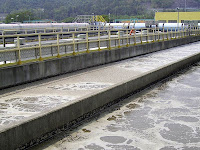 Reuters has a trenchant story by Alistair Doyle about sanitation: "The history of men is reflected in the history of sewers," French 19th century author Victor Hugo wrote in Les Miserables. "The sewer is the conscience of the city ... A sewer is a cynic. It tells everything." Judged by its sewers, the world is not doing well. Only 3 in 10 people now have a connection to a public sewerage system.
Reuters has a trenchant story by Alistair Doyle about sanitation: "The history of men is reflected in the history of sewers," French 19th century author Victor Hugo wrote in Les Miserables. "The sewer is the conscience of the city ... A sewer is a cynic. It tells everything." Judged by its sewers, the world is not doing well. Only 3 in 10 people now have a connection to a public sewerage system.And with the world's population expanding, a goal of improving sanitation by 2015 is slipping out of reach, despite progress in nations such as
Experts say a part of the solution, especially to cut water-borne diseases for the rural poor, may lie in renewed and smarter exploitation of nature -- for example through plants or soil bacteria that feed on waste.
…U.N. data show a child dies as a result of poor sanitation every 20 seconds -- that is 1.5 million preventable deaths a year from diseases such as diarrhea or cholera. … Proper sewers, with pipelines and treatment plants, are prohibitively costly for many nations. As a sign of low ambitions, the logo of the International Year of Sanitation shows a latrine built above a hole in the ground.
Among lower-cost projects, prisoners at the Shimo La Tawa jail in
…Such wetlands can have other spin-offs. "There are experiments going on in
…Many donors view water investments as too risky, partly because of problems of accountable financing, it said, adding that sanitation progress since the 1970s had been "glacial". Yet many firms stand to benefit from a focus on water and sanitation. Goldman Sachs sees prospects for growth in the water sector -- from drinking water to processing waste….
An aeration tank at the Sha Tin Sewage Treatment Works, photo by Chong Fat, Wikimedia Commons


1 comment:
Hello. This post is likeable, and your blog is very interesting, congratulations :-). I will add in my blogroll =). If possible gives a last there on my blog, it is about the Câmera Digital, I hope you enjoy. The address is http://camera-fotografica-digital.blogspot.com. A hug.
Post a Comment